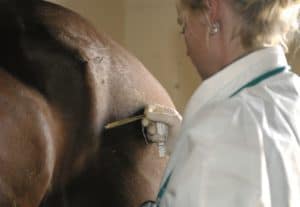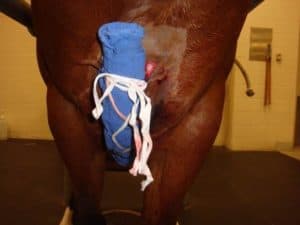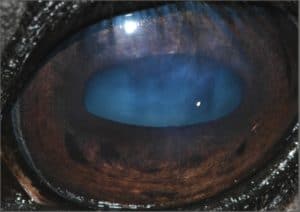
Managing Horses with Excessive Tearing
Excessive tearing could suggest a number of potentially serious equine eye conditions. Veterinarians should examine cases carefully and then determine an appropriate treatment course.


Excessive tearing could suggest a number of potentially serious equine eye conditions. Veterinarians should examine cases carefully and then determine an appropriate treatment course.

The North Dakota Department of Agriculture (NDDA) has indicated three cases of non-neuropathogenic equine herpesvirus-1 (EHV-1) have been confirmed in Burleigh County thus far in 2014.

The Wisconsin Department of Agriculture, Trade, and Consumer Protection has confirmed that a St. Croix County horse tested positive for equine herpesvirus-1 (EHV-1) yesterday (April 8).
As a senior horse owner, I’ll admit thatÑmore often than I’d like to own up toÑI get a bit nostalgic about my horses. Whether I’m

Regardless the reason for seeking to start or stop an estrous cycle, veterinarians have numerous options by which to “tailor” a mare’s reproductive cycle to meet her and your needs.

Tiny foals can have big health problems. Knowing what health problems to watch for, understanding how to manage them, and knowing when to call a veterinarian can mean the difference between life and death for your new arrival.

A horse exhibiting neurologic signs at a Wright County farm has tested positive for equine herpesvirus-1 (EHV-1), and several other horses residing at that farm were found to be shedding the virus.
A few weeks ago, I told you about 18-year-old Dorado’s spring check-up (more technically called a wellness exam). But today, I want to focus on

The Iowa Department of Agriculture and Land Stewardship has received test results confirming a single case of equine herspesvirus-1 (EHV-1) in that state.

Since March 7 at least eight horses have presented with acute neurologic disease. Of these, six horses have tested positive for the EHV-1 virus.

Six horses residing in McNair County, Tenn., located in the southwest part of the state, tested positive for equine infectious anemia (EIA) earlier this month.

Axillary wounds in horses might look minor, but can cause serious problems. Veterinarians need to manage such wounds quickly and carefully for best results.

Japanese researchers recently tested a supplement designed to alleviate both tying-up episodes and the muscle damage, with positive results.

When clouds start rolling in, it often means a storm is brewing. For horses with cloudy eyes, the source of that storm could be one of many. Fortunately, veterinarians are well-versed in the diagnostic and treatment options for cloudy-eyed horses.
Strangles is a highly contagious equine disease. Officials say the quarantine will last for at least five weeks.

Researchers found that the advantages of laparoscopy might not always outweigh the disadvantages in horses requiring surgery for cryptorchidism.
Stay on top of the most recent Horse Health news with